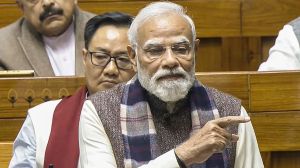Let them talk
During the last days of the 14th Lok Sabha,its speaker,Somnath Chatterjee,drew a dispiriting profile of the House. In a term of five years it had managed just 322 sittings.
During the last days of the 14th Lok Sabha,its speaker,Somnath Chatterjee,drew a dispiriting profile of the House. In a term of five years it had managed just 322 sittings. By his reckoning,423 hours had been lost to disruptions and adjournments due to disorderly scenes. Lists were compiled of the MPs who failed to participate in a single debate,and those who did not ask any question during Question Hour. As Parliament convenes for the Winter Session,can it mend expectations that,as proceedings get underway,nothing will really have changed?
Rajya Sabha Chairman and Vice President Hamid Ansari has offered a suggestion to break the mould. He recommends that political parties restrict whips to only those bills and motions that could impact the survival of the Central government that is,to money bills and confidence motions. It is,by the current parliamentary practice,a radical proposal. But political parties should find it worth their while to work towards a consensus on this. Anti-defection provisions,by which an MP can lose her membership of the House for defying a party whip,have given inordinate power to the party bosses. And,by extension,to the executive. As long as the government of the day commands adequate numbers in the two Houses,it can carry through the legislative business of its choice. Even the requisite give-and-take amongst coalition partners takes place outside of Parliament,and blocks of MPs have no choice but to line up as ordered. With voting outcomes pre-decided,there is little incentive for an MP to explore the nuances of a bill or motion. The same goes for opposition MPs,who must abide by their whips. The loss to Parliament is not just the hollowing out of debate. It also disallows the legislature from freeing itself from the executive,from asserting the stature that would come from articulating cross-party understanding on key issues of the day indeed,even from reflecting a deeper disagreement on an issue that may go beyond the party lines.
The purpose of the anti-defection legislation,which has been incrementally strengthened,was to avert the corrupt and destabilising effects of horse-trading. Yet,experience shows that it has also helped smother genuine debate. Ansaris recommendation should be seriously considered.
- 01
- 02
- 03
- 04
- 05































